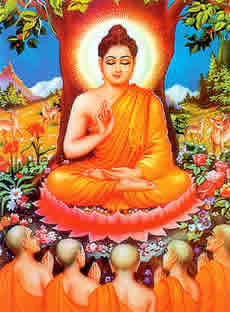 |
| Dharma Sutras |
Some sutras were developed and codified into shastras, which are more established frameworks of rules that were used to create Hindu laws.
The principal Dharma Sutra is considered to be the Manu-smrti (The Laws of Manu), which was created around 200 c.e. (although probably begun earlier) and consists of 12 chapters with a total of 2,694 verses.
The contents range from practical prescriptions for funerary and dietary practices to legal systems and religious strictures. This sutra acted as the law that governed the societies of much of India for a number of centuries.
  |
This led to the four-caste conception of society and the social structure that underlay the whole of Hindu society. The fundamental structure of society, therefore, has integrated within it the notions of hell, heaven, and the proper behavior of the individual as a member within a designated caste.
Another sutra of great influence and prestige was written by Yajnavalkya and has just over 1,000 verses arranged in areas relating to the law, expiation, and methods of good conduct.
This makes the canon rather lengthy in nature, and it contains disparate elements that would seem irrational from the Western point of view. However, the Hindu conception of the universe is able to reconcile these elements, so far as they are fully aware of them, into a coherent whole.
The Dharma Sutras are combined with the Srauta Sutras (dealing with sacrificial rituals) and the Grhya Sutras (dealing with domestic rituals) to make up the Kalpa Sutra, which is a manual of religious practice written in a short and aphoristic style that facilitates committing the material to memory.
Each school of the Vedas had its own Kalpa Sutra, and each Kalpa Sutra is one of the six vedangas, the canon of religious and philosophical literature, descended from the Vedas. They are created by humans and hence have the name smrti, or “tradition.”